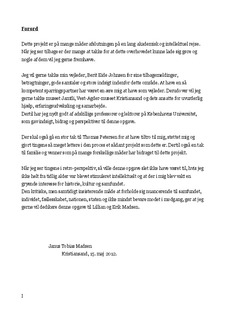| dc.description.abstract | The task for this master thesis, is to investigates the role of open-air museums have had on
communities in Scandinavia. I do this through a comparative analysis of two museums,
Jamtli in Österund, Sweden and Vest-Agder Museum Kristiansand, Norway. I look at how
knowledge, interpretation and portrayal is disseminated in these museums, and examines
how use of difficult topics are shown.
I examine how the open-air museums occur, how they evolve and how they are in response
to contemporary needs.
In addition, I analyze these museums into a social context, and here I use my own theory
which I have dubbed the museological-political complex. It makes me explain how
museums and especially open-air museums are part of a three-consensus: Government,
public and museum, where it is structurally very difficult for open-air museum to develop
and break out of. I go into impulses and am inspired by the available literature, but I am
also using interviews with visitors, employees, historians and other relevant persons in
order to refine and give a broad insight into a complex area like this.
There is existing research about museums, but they tend to be about communication,
pedagogy, how to handle objects and other studies of a more practical nature. That's why
this project is a relatively new field of research which I hope can contribute to further
research in this area.
I take a closer look at Norway and Sweden's official cultural policy in this area and
examines why these museums have - and looks like they do in modern times.
Many of these museums also show a desired self-image of what you think society should
look like. There is a thread from open-air museums and right up to today.
I point out to the end, in my conclusion-chapter, that the museum and open air museum is
too important a thing to leave it in that role as it has now become in modern Western
societies. As a forgotten thing, where large segments of the population never comes and
who suffer from many people's prejudices a dull place with no relevance to themselves. I
describe the importance of a museum role as an intellectual factor of the nation and draw a
paralel from the neglecting of museums to the neglect of democracy. | no_NO |
